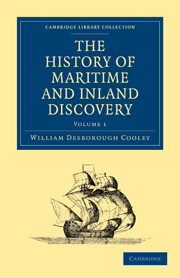Book contents
- Frontmatter
- Contents
- BOOK I GEOGRAPHY OF THE ANCIENTS
- CHAP. I
- CHAP. II THE GREEKS. — HOMERIC AGE
- CHAP. III GREEKS CONTINUED.—HISTORIC AGE
- CHAP. IV THE GREEKS CONTINUED
- CHAP. V GREEKS CONTINUED
- CHAP. VI THE GREEKS CONTINUED
- CHAP. VII DISCOVERY OF THE MONSOONS
- CHAP. VIII PTOLEMY
- CHAP. IX ON THE COMMERCE OP THE ANCIENTS
- CHAP. X MYTHIC GEOGRAPHY OP THE HINDOOS, AND ITS CONNECTION WITH GRECIAN MYTHS
- BOOK II GEOGRAPHY OF THE MIDDLE AGES
- BOOK III PROGRESS OF GEOGRAPHY IN THE MIDDLE AGES
CHAP. IV - THE GREEKS CONTINUED
Published online by Cambridge University Press: 05 July 2011
- Frontmatter
- Contents
- BOOK I GEOGRAPHY OF THE ANCIENTS
- CHAP. I
- CHAP. II THE GREEKS. — HOMERIC AGE
- CHAP. III GREEKS CONTINUED.—HISTORIC AGE
- CHAP. IV THE GREEKS CONTINUED
- CHAP. V GREEKS CONTINUED
- CHAP. VI THE GREEKS CONTINUED
- CHAP. VII DISCOVERY OF THE MONSOONS
- CHAP. VIII PTOLEMY
- CHAP. IX ON THE COMMERCE OP THE ANCIENTS
- CHAP. X MYTHIC GEOGRAPHY OP THE HINDOOS, AND ITS CONNECTION WITH GRECIAN MYTHS
- BOOK II GEOGRAPHY OF THE MIDDLE AGES
- BOOK III PROGRESS OF GEOGRAPHY IN THE MIDDLE AGES
Summary
The progress of geographical knowledge depends more on the general intercourse subsisting between nations than on the exertions of individual travellers. Such an intercourse existed but imperfectly in ancient times; and this circumstance, together with the scarcity of books (in consequence, of which contemporary authors were often ignorant of one another's labours), prevented the geography of the Greeks from reaching the perfection which might have been expected from the diffusion and enlightenment of that enquiring people. The voyages of the Carthaginian admirals, Hanno and Himilco, in the western ocean, along the coasts of Africa and of Europe, were unknown to Herodotus, although performed, apparently, long before his time. Yet among the early attempts at maritime discovery, of which we have any authentic accounts, these were, unquestionably, the most important.
Hanno was despatched by the senate of Carthage to establish some colonies on the western coast of Africa. The fleet which he commanded was composed of sixty large vessels, and had on board no less than thirty thousand persons of both sexes. After sailing for two days beyond the columns of Hercules, the fleet anchored opposite to a great plain, where a town called Thymiaterion was built, and a settlement effected. Still sailing westward, the expedition next arrived at the promontory of Soloe (perhaps Cape Cantin), covered with thick woods. Having doubled this cape, they built five other towns on the sea side, and at no great distance from one another.
- Type
- Chapter
- Information
- The History of Maritime and Inland Discovery , pp. 45 - 56Publisher: Cambridge University PressPrint publication year: 2010First published in: 1830



